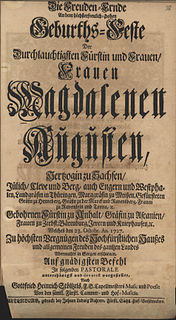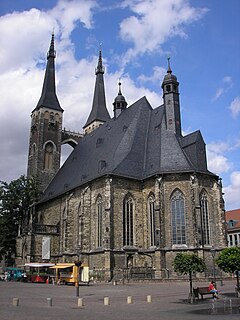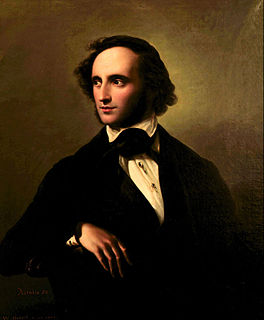
In western music, a motet is a mainly vocal musical composition, of highly diverse form and style, from the late medieval era to the present. The motet was one of the pre-eminent polyphonic forms of Renaissance music. According to Margaret Bent, "a piece of music in several parts with words" is as precise a definition of the motet as will serve from the 13th to the late 16th century and beyond. The late 13th-century theorist Johannes de Grocheo believed that the motet was "not to be celebrated in the presence of common people, because they do not notice its subtlety, nor are they delighted in hearing it, but in the presence of the educated and of those who are seeking out subtleties in the arts".

Gottfried Heinrich Stölzel was a prolific German composer of the Baroque era. Stölzel was an accomplished German stylist who wrote a good many of the poetic texts for his vocal works.

Psalm 100 is the 100th psalm in the Hebrew Bible of the Book of Psalms. In English, it is translated as "Make a joyful noise unto the Lord, all ye lands" in the King James Version (KJV), and as "O be joyful in the Lord, all ye lands" in the Book of Common Prayer (BCP). Its Hebrew name is מִזְמוֹר לְתוֹדָה, 'Mizmor l'Todah' and it is subtitled a "Psalm of gratitude confession". In the Greek Septuagint version of the Bible, and in the Latin Vulgate, this Psalm is Psalm 99 in a slightly different numbering system. In the Vulgate, it begins Jubilate Deo or Jubilate, which also became the title of the BCP version.
Sebastian Knüpfer was a German composer, conductor and educator. He was the Thomaskantor, cantor of the Thomanerchor in Leipzig and director of the towns's church music, from 1657 to 1676.
Karl Piutti was a German composer and organist.

Singet dem Herrn ein neues Lied, BWV 190, is a church cantata by Johann Sebastian Bach. He wrote it in Leipzig for the New Year's Day and first performed it on 1 January 1724 as part of his first cantata cycle. He adapted it in 1730 to Singet dem Herrn ein neues Lied, BWV 190a, for the celebration of the bicentennial of the Augsburg Confession.
Johann Justus Kahle was a German organist and composer.
Klaus Hofmann is a German musicologist who is an expert on the music of Johann Sebastian Bach.
Vereinigte Zwietracht der wechselnden Saiten, BWV 207.1, is a secular cantata composed by Johann Sebastian Bach and first performed on 11 December 1726 in Leipzig.

Lobet den Herrn, alle seine Heerscharen, BWV 1147, BWV Anh. 5, is a church cantata text by Christian Friedrich Hunold which was performed, most likely in a setting by Johann Sebastian Bach, for the twenty-fourth birthday of Prince Leopold of Anhalt-Köthen on 10 December 1718. The composition is lost, but its libretto survives in a 1719 print.
Jauchzet dem Herrn alle Welt is a three-movement pasticcio motet for double SATB choir. It includes music by Georg Philipp Telemann and Johann Sebastian Bach. The text of the motet is a German paraphrase of Psalm 100.

Der 100. Psalm, Op. 106, is a composition in four movements by Max Reger in D major for mixed choir and orchestra, a late Romantic setting of Psalm 100. Reger began composing the work in 1908 for the 350th anniversary of Jena University. The occasion was celebrated that year with the premiere of Part I, conducted by Fritz Stein on 31 July. Reger completed the composition in 1909. It was published that year and premiered simultaneously on 23 February 1910 in Chemnitz, conducted by the composer, and in Breslau, conducted by Georg Dohrn.
"Auf, Christen, singt festliche Lieder" is a German Christmas carol. A first text was written in 1778 by August Erthel, which was first published in Fulda with a first melody that year. Heinrich Bone modified the text in 1851 for his hymnal Cantate!. It was sung with different melodies.
"Nun jauchzt dem Herren, alle Welt" is a German Christian hymn, a paraphrase of Psalm 100. The text was written by David Denicke, based on a metered paraphrase of the psalm from the Becker Psalter, and published in his 1646 hymnal. The song appears in modern German-language hymnals, such as the Protestant Evangelisches Gesangbuch and the Catholic Gotteslob. With a joyful melody derived from a 12th-century model, it is one of the most popular psalm songs in German.

Jauchzet dem Herrn, alle Welt, WoO. 28, is an anthem for choir a cappella, a setting of Psalm 100 in German composed by Felix Mendelssohn in 1844. It was published in 1855 after the composer's death. It is the most popular setting of Psalm 100 by Mendelssohn, who also wrote a four-part motet in Latin, "Jubilate Deo", as part of Three Motets, Op. 69, in 1847 for use in the Church of England, which adds a doxology to the psalm text. He set the psalm again, but with paraphrased text by Ambrosius Lobwasser, "Ihr Völker auf der Erde all", as part of Sieben Psalmen, harmonising melodies from the Genevan Psalter.

Carl Josef Thiel was a German organist, church musician and professor of music.







